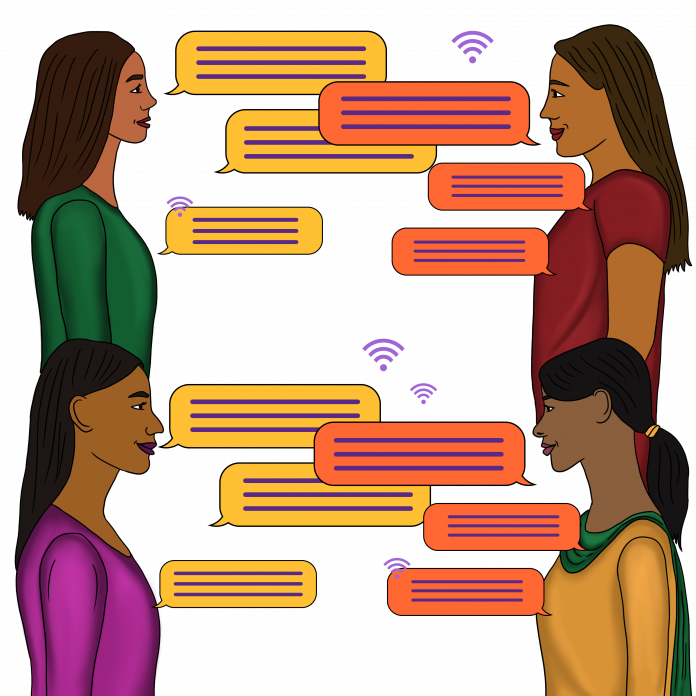By Sabah Bano Malik
A few months ago, in a discussion during a fiction writing class, my fellow writers and I were examining a novel by a feminist female author – the book was centered around a female friendship and how it aged over time. The different paths the protagonists went, the different hurdles they faced as individuals and the conflicts that arose not only from their relationship but surrounding the orbit of it.
When we read about or see female friendships play out in books or television, the friendships are often romanticized – they can lead to the viewer or reader even being envious or think something is wrong with them for not having these kinds of relationships in their own lives.
Finishing each other’s sentences or easing into one another’s families – sometimes replacing families, knowing how to comfort one another and how to make one another laugh, the female friendship looks as desirable as it does necessary.
But for many Pakistani women, establishing connection with their female peers is amongst the list of things that they are actively barred from, the chance to make friendships with other women openly and without caution is not possible.
The “Madonna verses the whore” complex in Pakistan is one I like to call “good woman verses bad woman culture.”
Good girls adhere strongly to the list of barred things in order to become good women: no wearing jeans (salacious), no cutting long hair into short hair (antagonizing), studying but only to a certain point (to free), not marrying for choice (familial destruction) but agreeing to whatever mom and dad decree your husband to be.
And another thing good girls on their way to becoming good women, good respectable women, good obedient respectable women, often forego in order to become all that their families, culture, society and oppression can stomach them being is friendship with other girls, who if they were to on the good woman path would not be befriending them to begin with.
Of all the things, the many things, that we are stopped from partaking in – why is creating a community for yourself with other girls one that gets chapals thrown and paranoia mounting?
When talking about this anti-friend phenomena in class I mentioned that it sort of reminded me of what I had previously learned about music and why we, no matter how old we get, seem to gravitate to the music of our youth.
When we are young the first music we listen to and gain a relationship with sticks with us for the rest of our life because (as my internet research alleges) it’s our first independent choice, outside of our parents. We are developing taste and finding the magic of sounds and beats that speak to us and it’s something we are doing all on our own and with that a lifelong allegiance is made, and no matter how much time passes this music that resonated with us and was the soundtrack to us becoming our own selves, still evokes that little bit of power we did not know we were exercising back then.
And as the cliché goes our parents often hate what we like musically, so that brings us to friends.
If musical choices can ignite independence what could the actual sharing of thoughts, hopes, emotions and experiences with actual girls do? Girls who like their own daughters are growing up and possibly outgrowing or beginning to question the restraints on them, or even just want a place to share pieces of who they are outside of the watchful eyes of mom, dad, khandan or more – the risk of independence being born is far too great.
So they squash it.
The enemy of the insurance a good woman is being produced is autonomy, independence and a curious open mind, I am not saying that ALL parents are enemies of their daughters growing as individuals – that would be insane, but I am saying that parents definitely like having a say (and control) in how their daughters evolve and if a third party and their wacky ideas are thrown into the mix, that control, that grip on their daughter’s narrative is threatened.
Friendship, particularly between girls and women, is often the core of many of a coming-of-age story or a rediscovering your femininity story, think ‘Sex and the City’ or ‘The Sisterhood of the Traveling Pants.’ It’s seen as a right of passage or the earning of some level of growth. Women in friendship are guides, are shoulders to lean on, are encouragement and help shape or at least push us to shape who we are.
Women and girls who have bonded in these depictions are shown to be sharing secrets; discovering themselves; dabbling in experimentation and growing up side by side, they are making mistakes (something Pakistani girls have very little leeway to do) – and doing so together, sometimes because of each other.
But mistakes, secrets, independent growth, and especially experimentation are the equivalent of hard drugs, sex and rock & roll as far as Pakistani culture goes. Friendship is viewed as an assertion of independence and noncontrollable (by families) exposure to new ideas and influences. So many young girls are not only discouraged from forging connections with their female peers but outright forbidden from it.
When I was growing up my mom was the kind of person who thrived on friendship and especially female connections. It was not uncommon that nearly every day of the week she would have plans for a lunch, or a charity meeting, or a dinner, or a quick coffee with a friend. On the weekends she was OUT – always out. Often dragging us out with her.
She had an active social calendar that was filled with meeting other Pakistani women like herself, immigrants in a country they had always wanted to get to, an escape from Pakistan but firmly planted in a large Pakistani community when they moved there.
Finding one another began in the 70s and 80s when they first moved to the states and established home fronts the way immigrants often do, by word of mouth or family that got there before or someone who knew someone who was already in a city they swear was warm and friendly, and most importantly filled with fellow Pakistanis. Generations kept the friendships flourishing between Pakistani women in that community, including those hyphenated with -American.
That included my sister and I.
My and my sister’s friends were the daughters of our mom’s friends, and like our moms we were actively meeting on the weekends, developing bonds and building those friendly female tropes that played out on TV in real life – the families being friends helped for everyone, us being friends meant they could socialize with each other and yet keep an eye out on who we were mingling with.
Because though I was encouraged to be friendly and have strong, nourished and lasting friendships with these friends, they all did belong to the same community that all our moms had watchful eyes on.
And we all fell into the paths to be “good girls,” by fulfilling the most important qualities good girls growing up outside of Pakistan whilst being Pakistani had.
We were all actively Pakistani. We were all Muslim. And these two facts umbrellaed under “our moms often spoke on the phone” made our friendships palatable for our parents.
Very few of us had long standing friendships with our peers of different backgrounds from school or sports, the active investment in friendship, that was supported by and aided by moms and dads was those that could be controlled, or at least believed to be controlled.
Us all being a certain type of person with a certain type of access granted to our parents meant all of our interactions were at least happening under an illusion of regulation.
It was when we went to university that many of us broke the convincing that the only friends you should have are those just like you, and those that grew up with you, and those that your parents already knew.
When I decided to explore this very specific and (sadly) highly relatable topic, I decided to turn to the internet where I had found a plethora of female comrades, and many others had as well ,to ask who had experienced this ugly bit of culture and the numbers were staggering.
In total 1800 women responded to a survey I conducted regarding female friendship hurdles, 62% confirmed that their families had tried to stop friendships outright, 60% confirmed that if not outright denied making friendships they were discouraged from it or the environment was such that being friends with anyone was often made difficult.
The reasons these women were given?
- Girls cannot be trusted, they are a threat to your marriage, they will steal rishtas, they will harm your reputations
- Girls who wear jeans are bad
- Girls are too “smart” or “chalak,” they are “cunning”
- Girls perceived as sluts for being outspoken, wearing western clothes, getting average grades, having a loud laugh or having a divorced parent (the logic is as lost on me as it is on you)
- Family over friendship, though this rarely applied to brothers
- Friendships are temporary
- Friends forget you once they are married, and they will be married and you won’t because you were too busy being their friend
- They were perceived to be queer, and queer girls cannot be your friends
- Daughters do not make friends
When I asked these women how not being able to forge and empower friendships impacted them, many said that the scars have remained well into their 30s, 40s and 50s. They feel an inability to connect with anyone, let alone other women
They feel the lack of female support pushed them towards toxic men, put them in dangerous situations, kept them ignorant and without the tools they need to navigate the world.
They feel socially inept.
They feel they lack confidence.
They feel lonely.
They feel isolated.
They feel sad.
When I asked women why they felt they were kept from making friends in addition to all I wrote out above, a few said, and I am paraphrasing but, what could be more threatening to parents who uphold patriarchal structures then women joining hands and finding power together.
Keeping girls and women apart, keeps the patriarchy sleeping tight.
It sounds ridiculous to those that have the privilege of not having to think about these things but when you have heard phrases like “women are women’s biggest enemies,” particularly in a country with an active violence against women problem and a femicide – the eye roll is hard to push away because hey – it’s actually true.
Having women view one another with suspicion and ill intent, as threats to the most important thing our culture demands – hetero marriage, keeps the patriarchy feeling tight. They say an apple a day keeps the doctor away, well women kept from one another a day keeps salivating women haters happy. I don’t have a rhyme with that.
But many girls, women and members of Pakistan’s queer community who have also faced isolation and shunning of friendship with women, have found a way to connect: online.
The digital world, Twitter, Instagram, WhatsApp have crafted a place where people whose socializing has been long under the thumb of the powers that be (mommy and daddy, and log of log kya kehenge) can find one another, can speak to one another, can learn from and rely on one another.
In my survey I asked women if being online had helped them make friends and find community, 83% of them said, yes it absolutely had.
One woman I spoke with shared how going online made her feel less crazy and also exposed her to her own bias against women. She had grown up with the lesson that trust no girl and no woman because inherently women were cut from the itchiest of disloyal cloth.
But she turned to the internet to find community with women in particular, feeling the burden of the times we are living in (I did not exaggerate earlier they really are killing women and trans folks out here at alarming rates, and that’s only what we know) she wanted to talk to someone, anyone who made her feel understood, who could relate to how she was feeling.
And she found it. Easily. From having not a single friend outside of her family and husband (and kids) before, she now counts many friends online. And she admitted that though she felt ashamed sharing with them that she never wanted to be friends with women before, she was shocked how many had felt the same way.
The online space has surpassed moms, dads, society and introduced to many people in Pakistan that they can have friendships, that they can forge supportive groups and they can have the friendships that play out on screens and novels but were not available for them to have.
I myself have found many friends there, I am submitting this article to one of them. And when my parents ask me how I know people I mention, people I call my friends, I always get a little kick from saying, “Oh you don’t know them, I met them online.”






